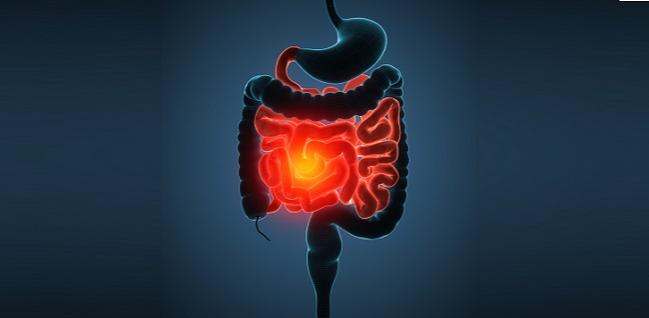Increased ASCVD Risk With Inflammatory Bowel Disease Merits Team-Based Care
A new review explores the overlap between the two, urging cardiologists and gastroenterologists to communicate.

Inflammatory bowel disease (IBD) has thus far been overlooked as a contributor to atherosclerotic cardiovascular disease (ASCVD) risk, urges a new review that outlines what’s known about the overlap between the two and offers advice on next steps.
While the “inflammatory hypothesis” for cardiovascular disease has recently gained traction—what with positive results from CANTOS, COLCOT, and LoDoCo2—data specific to IBD are scarce, authors say.
The broad umbrella of IBD includes several conditions that involve chronic inflammation of the intestinal tract, most commonly ulcerative colitis and Crohn’s disease. Across the world, it affects 6.8 million people, the authors note in their paper. “The peak incidence of IBD occurs between the second and fourth decades of life, resulting in a long lifetime exposure to chronic systemic inflammation in these patients.”
This long time frame presents cumulative risk but also opportunities for prevention, senior author Khurram Nasir, MD (Houston Methodist DeBakey Heart & Vascular Center, TX), told TCTMD, so it’s important to raise awareness within the cardiovascular community.
The most-recent US guidelines on primary prevention and cholesterol management list “chronic inflammatory conditions such as psoriasis, rheumatoid arthritis, lupus, or HIV/AIDS” as risk-enhancing factors, without mentioning IBD. European dyslipidemia guidelines say that “chronic immune-mediated inflammatory disorders” modify risk, the review notes.
In the absence of recommendations specific to this area, a multidisciplinary approach will best serve patients with IBD, Nasir said. “There should be a more coordinated effort from both gastroenterologists and preventive cardiologists—that’s number one. Number two, there needs to be a stronger emphasis on identifying and controlling the traditional cardiovascular risk factors,” such as smoking. And finally, he added, standard medical therapy aimed at CVD—eg, statins—might not only reduce cardiovascular risks but prove beneficial in mitigating IBD itself, as might newer drugs like anti-TNF agents.
The gut is the biggest immune organ in our body. Khurram Nasir
Nasir said he was inspired to undertake the review after encountering a young woman with early heart disease plus a long history of IBD. “We started looking to say, hey, what do we know? And it was humbling that although in [specialty] silos we know a lot, in 2020 it hasn’t transformed into any actionable plan for this population [affecting millions] globally,” he said. An incentive was that, compared with other inflammatory conditions, including psoriasis, far less is known about the CV risks inherent to IBD and what clinicians should be doing to mitigate them.
Key to this work, said Nasir, was collaboration among gastroenterologists at their center also studying the mechanisms of IBD as well as with Nehal N. Mehta, MD, who leads the National Institutes of Health’s research program on inflammation and cardiometabolic diseases. The team effort was published online this week in the Journal of the American College of Cardiology, with Miguel Cainzos-Achirica, MD, PhD (Houston Methodist), and Kerri Glassner, DO (Houston Methodist and Weill Cornell Medical College, Houston), as dual first authors.
Based on the “strategic blueprint” that emerged, Houston Methodist is now pursuing additional research in this area, Nasir said. “Moving forward, we still need a lot of work in trying to understand the heterogeneous association between IBD and early [ASCVD] development,” which in turn will not only provide knowledge about the biologic process but also help in risk stratification and treatment.
An ‘Up and Coming Space’
So where to begin? As the authors write, “IBD is thought to be the result of complex interactions among the environment, microbiota, and immune system in genetically susceptible persons.”
Similarly, the mechanisms behind the link between IBD and cardiovascular risk “include overlapping risk factors, inflammation, microbiome abnormalities, endothelial dysfunction, thrombogenicity, lipid dysfunction, and the impact of corticosteroids,” they say, emphasizing that IBD is a systemic disease, with fully 40% of patients developing non-GI manifestations.
At the recent American Heart Association 2020 Scientific Sessions, Nasir and colleagues presented two abstracts that partly fill in the evidence gap. One showed a higher burden of cardiovascular risk factors among patients with IBD, even in the absence of clinical ASCVD. The other suggested that young adults—but not elderly individuals—are more apt to have coronary artery calcification (CAC) if they have IBD.
To TCTMD, Nasir highlighted a few possibilities for future research among the many listed in their paper. CT angiography may be able to detect subclinical ASCVD in IBD patients, enabling a better look at the natural history of how the two conditions evolve, while “multiomics” that takes into account not only genetics but gene modifiers like microRNA could offer insights, he said. Alterations in the GI tract’s microbiome also merit attention, Nasir continued, noting: “The gut is the biggest immune organ in our body. How does that not only impact the worsening of IBD but also [contribute to the increased] risk of cardiovascular disease?”
Additionally, closer investigation “will help better characterize ASCVD risk heterogeneity among patients with IBD, aiding the early identification of highest-risk patients, as well as of atherosclerosis-resilient phenotypes in which aggressive ASCVD preventive therapies may not be justified,” the review notes.
In clinical practice today, there’s little awareness of the overlap—GI specialists rarely consider cardiovascular risk, while IBD is not on the radar of cardiologists, he observed. The good news, said Nasir, is that the slim evidence base is maturing: “This is an up and coming space where people have started tiptoeing and trying to understand.”
Caitlin E. Cox is Executive Editor of TCTMD and Associate Director, Editorial Content at the Cardiovascular Research Foundation. She produces the…
Read Full BioSources
Cainzos-Achirica M, Glassner K, Zawahir HS, et al. Inflammatory bowel disease and atherosclerotic cardiovascular disease. J Am Coll Cardiol. 2020;76:2895-2905.
Disclosures
- Cainzos-Achirica reports no relevant conflicts of interest.
- Nasir is on the advisory boards of Amgen, Novartis, and The Medicines Company. His research is partly supported by the Jerold B. Katz Academy of Translational Research.


Comments